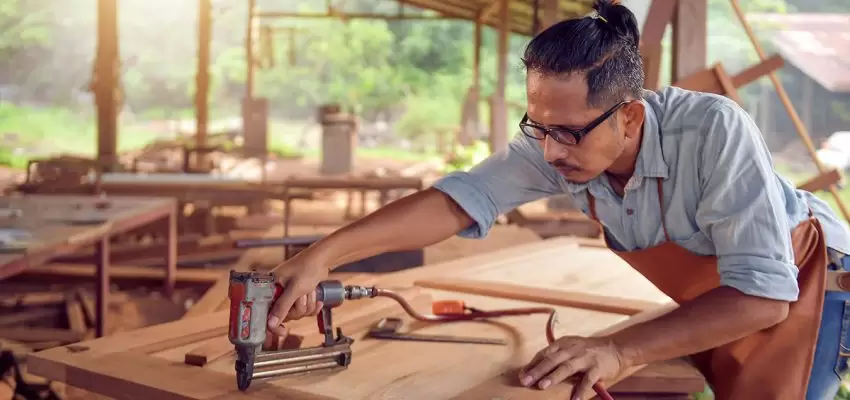Whether building a new home, remodeling your kitchen, or constructing a backyard deck, hiring a professional carpenter offers many advantages over tackling woodworking projects alone. Skilled carpenters apply extensive expertise to correctly and efficiently execute critical construction tasks while observing safety best practices. They also utilize premium tools and methods inaccessible to casual hobbyists. Understanding the top 10 benefits of partnering with qualified carpenter services brings the value of furniture carpentry, interior woodworking, and custom builds into focus.
Post your Requirement
|
Benefit |
Description |
| Expertise and Specialization |
Professional carpenters have undergone extensive training and apprenticeships, specializing in various areas such as fine furniture building, staircases, and cabinetry. |
| Efficiency and Time Savings |
Working with skilled carpenters accelerates project pace as they can efficiently sequence tasks and identify potential delays early on. |
| 2. Access to Advanced Tools/Equipment |
Carpenters invest in commercial-grade power tools and specialty equipment, increasing productivity, accuracy, and quality of work. |
| Material Procurement and Management |
Professional carpenters maintain wholesale accounts with lumber suppliers, manage material inventory across projects, and ensure efficient transportation and storage of materials. |
| Legal/Regulatory Compliance |
Accredited professional carpenters ensure compliance with carpentry codes and regulations, ensuring structural integrity and safety while avoiding legal issues. |
| Structural Integrity and Risk Mitigation |
Skilled carpenters understand load requirements and capacities, properly size critical components, and ensure builds meet or exceed legal standards to mitigate risks of collapse or injury. |
| Flawless Finish Carpentry Professional |
l finish carpenters combine science and art to create stunning interiors, paying meticulous attention to detail, joints, transitions, and optimal lighting to achieve flawless results. |
| Reliability and Accountability |
Professional carpenters stand behind their bids, schedules, and craftsmanship, carrying substantial insurance policies to cover various liabilities and offering assurances for successful project outcomes. |
| Problem-Solving and Adaptability |
Skilled carpenters adapt to changing project needs, employing ingenuity and field experience to assess the feasibility of complex designs and implement viable alternatives as challenges arise. |
| Clean and Safe Job Sites |
Carpenters prioritize safety and cleanliness on job sites, implementing strict protocols for tool usage, debris removal, material storage, and wearing protective gear to mitigate injury and project delays. |
1. Expertise and Specialization:
Carpenters undergo extensive training and apprenticeships to master structural design, material selection, joinery techniques, finishing methods, and problem-solving. Seasoned carpenters further specialize in areas like fine furniture building, staircases, door/window installation, cabinetry, ornamental detail, and commercial or residential framing. This depth of carpentry knowledge and narrow specialization produces superior results compared to DIY builds. Professional carpenters also understand how environmental conditions impact wooden structures over time.
2. Efficiency and Time Savings:
Working alongside competent carpenters accelerates project pace. They know how to sequence tasks in the most efficient order, often completing work several times faster than non-professionals. This experience also allows them to identify time/cost overruns early. A carpentry team’s skill overlaps additionally minimize project delays. Their familiarity with common build challenges makes it far easier for carpenters to navigate unexpected situations.
3. Access to Advanced Tools/Equipment:
Carpenters invest heavily in commercial-grade power tools like table saws, lathes, planers, jointers, drill presses, sanders, and routers well beyond most homeowners’ price points. This professional gear increases productivity, accuracy, and quality. Industrial air compressors, laser levels, lift equipment, and specialty carpentry tools also reside in their equipment arsenals. Knowledge and proper operation of these woodworking assets are mandatory.
4. Material Procurement and Management:
Professional carpenters maintain wholesale accounts with lumber suppliers securing premium-grade stock at discounted prices. They also own woodworking vehicles and trailers appropriately sized to efficiently transport raw materials safely. Inventory systems track material orders, delivery schedules, and usage across concurrent projects. This facilitates advanced planning around costing, procurement timing, site storage, and material handling… all difficult for non-professionals to perform.
5. Legal/Regulatory Compliance:
Extensive carpentry codes and regulations govern structural specifications, permitting, inspection requirements, safety, environmental practices, and insurance coverage. Keeping current across rapidly evolving standards, demonstrating sound practices upon scrutiny, and properly documenting builds takes years to master…but accredited professional carpenters handle it daily. Failure to comply puts inhabitants and buildings themselves at risk while violating local laws.
6. Structural Integrity and Risk Mitigation:
Careless woodworking compromises structural integrity severely risking collapse, injury, and loss of life. Professional carpenters intimately understand load requirements and capacities across floor/ceiling spans, stairwells, shelving, furniture, staircases, and railings. They properly size critical framing components and anchoring hardware and confirm builds meet or exceed legal requirements. Carpenters keep inhabitants safe through their mastery of tension/compression dynamics across building materials.
7. Flawless Finish Carpentry:
Professional finish carpenters blend science and art to create stunning interiors. They envision design intent through the eyes of inhabitants and architectural goals. Meticulous milling, joining, shaping, trimming, and distressing techniques manifest flawless built-ins, custom casework, fireplace mantels, and fine furnishings. Carpenters finesse joints/transitions, specify optimal lighting and influence material/finish selections impacting aesthetics and durability. Their steadfast attention to precision and detail satisfies even the most scrutinizing clients.
8. Reliability and Accountability:
Unlike some contractors notorious for incomplete work and broken commitments, professional carpenters stake their reputations on making reliably sound recommendations. They stand behind bids, schedules, solutions, and craftsmanship. Established carpentry services vet personnel and trade partners closely. They also carry substantial insurance policies covering worker injuries, third-party liabilities, site damages, and performance guarantees. These assurances give clients confidence in successful build outcomes before projects ever begin.
9. Problem Solving and Adaptability:
Sites and client needs constantly change throughout builds. Professional carpenters adapt on the fly as challenges emerge while keeping projects on time and budget. Custom applications requiring non-standard solutions play to their ingenuity. Engineers consult with seasoned carpenters when assessing the feasibility of complex designs. Extensive field experience empowers carpenters to effectively evaluate many unforeseen situations mid-project and quickly implement viable alternatives.
10. Clean and Safe Job Sites:
Carpenters prioritize safety and cleanliness when occupying job sites. They isolate construction zones from inhabitants and the public. Ongoing debris removal and environment containment ensures clean, accessible adjacent spaces. Strict protocols govern tool usage, work at height, noise levels, material storage, and disposal. Carpenters wear protective and highly visible gear. They know compliance now mitigates injury, discomfort, and project delays. Their continuous attention to safety keeps all parties optimistic.
Conclusion
Attempting carpentry projects without sufficient expertise exposes homeowners to considerable financial, structural, regulatory, and personal safety risks. Employing qualified professional carpenters pays dividends across planning, execution, risk reduction, aesthetics, durability, and compliance. Their specialized equipment, sourcing, techniques, oversight capabilities, and problem-solving skills consistently capture design intent in the most time and cost-effective manner possible. Professional carpenters help ensure successful builds from permitting to final walkthroughs.























Post A Comment